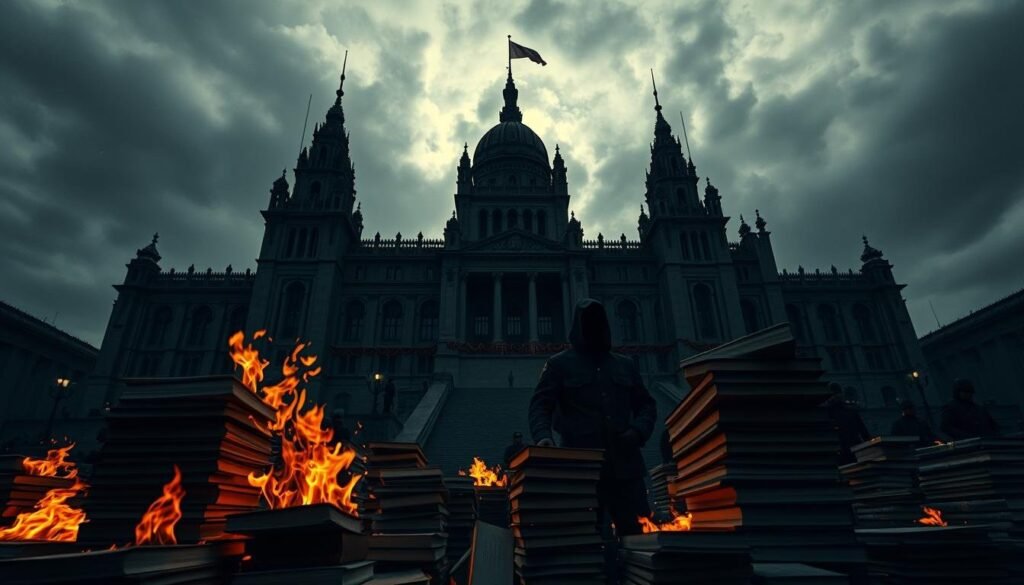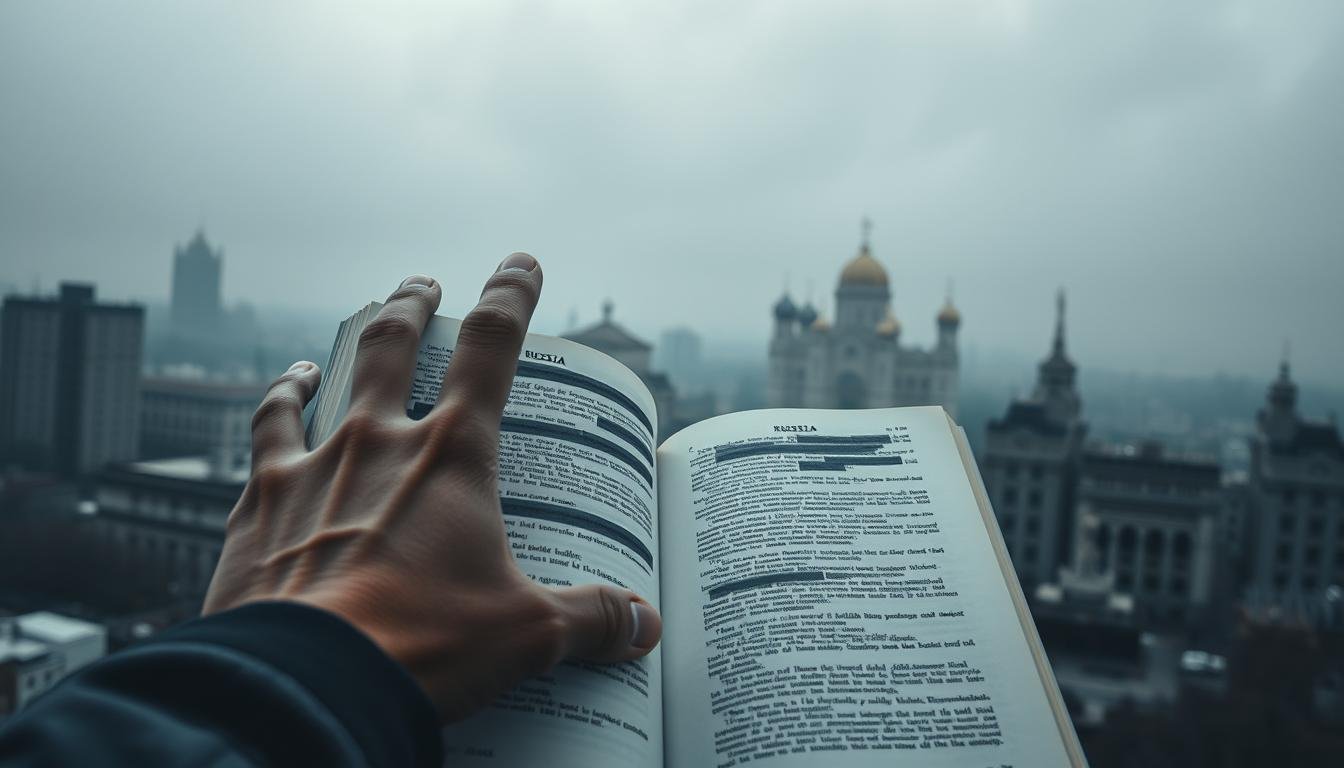George Orwell’s classic, Animal Farm, has sparked a big debate in Russia. As you learn more, you’ll see why this book is so important.
The book is an allegory that has caused a lot of discussion. You might wonder why it was censored in Russia. Reading on, you’ll learn about the historical, political, and cultural reasons behind this censorship.
In this article, we’ll dive into Russian censorship and its effect on books like Animal Farm. By looking at the controversy around this novel, you’ll understand better the battle between freedom of speech and government control.
Contents
- 1 The Historical Context of Animal Farm
- 2 Animal Farm During the Soviet Era
- 3 Is Animal Farm Banned in Russia Today?
- 4 Political Reasons Behind Russian Literary Censorship
- 5 Animal Farm in Russian Education and Culture
- 6 Conclusion
- 7 FAQ
- 7.1 Is Animal Farm still banned in Russia?
- 7.2 Why was Animal Farm banned in the Soviet Union?
- 7.3 How did George Orwell’s background influence his writing of Animal Farm?
- 7.4 What is the significance of Animal Farm in understanding the Cold War era?
- 7.5 How does censorship in Russia impact literature and society?
- 7.6 Is Animal Farm part of the Russian literary canon?
- 7.7 How is Animal Farm perceived by the Russian public and intellectuals?
- 7.8 What are the legal factors influencing censorship in contemporary Russia?
- 7.9 How does Animal Farm feature in Russian education?
The Historical Context of Animal Farm
Exploring Animal Farm’s historical context reveals how Orwell’s life influenced the story. George Orwell, whose real name was Eric Arthur Blair, was a British author. He was known for his sharp critiques of totalitarian regimes.
His time in the Spanish Civil War and watching fascist and communist rise in Europe shaped Animal Farm.
Publication and Initial Reception
Animal Farm was first published in 1945 by Secker and Warburg. The novel got mixed reviews at first. Some critics loved its originality and powerful allegory.
Others thought it was too simple or missed its political message.
The table below summarizes the initial reception of Animal Farm in various countries:
| Country | Initial Reception |
|---|---|
| United Kingdom | Mixed reviews, praised for originality |
| United States | Generally positive, seen as an anti-Soviet allegory |
| Soviet Union | Not published, viewed as anti-communist propaganda |
Orwell’s use of an animal fable to tell the story of the Russian Revolution struck a chord. It matched the Western world’s view of the Soviet Union during the Cold War. Knowing this history helps us understand why Animal Farm is both significant and debated.
The book’s themes of power corruption, the dangers of totalitarianism, and the loss of freedom are still relevant today. This makes it a classic that continues to captivate readers.
Animal Farm During the Soviet Era
Animal Farm, a novella, got caught up in Soviet censorship during the Soviet Era. The Cold War made the Soviet Union wary of Orwell’s work. They saw it as a critique of their regime.
Animal Farm as a Target of Censorship
The novella challenged Soviet ideology, making it a target for censorship.Censorship mechanisms tried to keep it out of sight. The Soviet government saw it asanti-Soviet propaganda and banned it.
The censorship of Animal Farm had a big impact. It was hard to find in the Soviet Union. When it was available, it came with harsh criticism. This made the novella even more controversial.
Looking at Animal Farm’s fate in the Soviet Era helps us understand censorship and politics. The ways censorship and propaganda worked showed the era’s deep divisions.
Animal Farm’s story shows its influence went beyond books. It gives us a peek into the Cold War’s politics and beliefs. Its journey through the Soviet Era shows how literature can challenge and change ideas.
Is Animal Farm Banned in Russia Today?
In today’s Russia, “Animal Farm” faces legal and cultural hurdles. It’s not banned outright, but its availability is limited. This is due to strict censorship laws and cultural views.
Russia’s censorship laws have tightened over time.Censorship lawsnow target sensitive or critical content. “Animal Farm” critiques totalitarian regimes, making it sensitive.
Legal and Cultural Factors Influencing Censorship
Several factors affect “Animal Farm” in Russia. Legal changes since the Soviet era have shaped censorship. Modern laws aim to protect national security and public morality.
Cultural views also matter. “Animal Farm” is seen through a historical lens. Some see it as a critique of totalitarianism, while others view it as Cold War propaganda.
Debates over including “Animal Farm” in schools show the tension. It’s a complex issue, influenced by legal and cultural factors. This highlights the challenges of literary censorship in Russia.
In summary, “Animal Farm” is not banned in Russia but is restricted. Legal and cultural factors play a role. Understanding these helps grasp the context of literary censorship in Russia today.
Political Reasons Behind Russian Literary Censorship
Exploring Russian literary censorship reveals the political reasons behind it. The political climate in Russia has greatly influenced censorship policies. This affects literature and society deeply. Censorship is used to control the narrative and silence dissenting voices.

The history of Russian censorship goes back to the Soviet era. Literature was heavily censored to fit communist ideology. Works seen as counter-revolutionary or threatening were banned or edited heavily. This legacy still shapes today’s censorship in Russia.
Impact on Literature and Society
The effects of Russian literary censorship are significant. It has limited creative freedom, forcing authors to self-censor or publish abroad. Yet, it has also united writers and readers who want to challenge the status quo.
- Censorship has led to underground literature, with works shared secretly.
- It has also made authors use allegory and metaphor to subtly critique the political climate.
- The societal impact is huge, shaping public discourse and how people get information.
In conclusion, Russian literary censorship’s political reasons are complex. They show a mix of government control and cultural expression. As you delve deeper, you’ll understand more about literary freedom and societal dynamics.
Animal Farm in Russian Education and Culture
The novelAnimal Farmby George Orwell has a complex relationship with Russian education and culture. You might expect a novel allegorizing the Russian Revolution to be a staple in Russian literature classes. However, its presence is more nuanced.
Cultural Significance and Public Perception
In Russian education,Animal Farmis not a standard component of the curriculum. The novel’s critique of Soviet ideology makes it a sensitive topic. Despite this, it has a certaincultural significanceamong intellectuals and those interested in political literature. The public perception ofAnimal Farmvaries; some view it as a critique of totalitarianism, while others see it as a product of Western anti-Soviet propaganda.
Theliterary canonin Russia is rich and heavily influenced by the country’s history and political climate.Animal Farm‘s absence from mainstream education reflects its controversial status. Nonetheless, its influence can be seen in discussions around political freedom and the dangers of totalitarian regimes.
In conclusion,Animal Farmoccupies a unique position in Russian culture, symbolizing the tension between artistic expression and political censorship. As you explore Russian literature and its cultural context, understanding the role ofAnimal Farmprovides valuable insights into the country’s complex literary and political landscape.
Conclusion
You’ve looked into George Orwell’s Animal Farm’s complex history in Russia. It started with a mixed reaction during the Soviet era. Now, it’s a key part of Russian society.
The book’s themes of rebellion, power, and corruption still spark debates. These debates are about literary freedom and Russian censorship.
Thinking about the history, politics, and culture of Animal Farm shows its lasting impact. It challenges censorship and supports freedom of speech. Its place in Russian education and culture shows literature’s power to shape our views and inspire thought.
In short, Animal Farm’s story in Russia highlights the need to protect literary freedom. It encourages a culture of open expression. As you think about Russian censorship’s effects on literature, remember literature’s role in shaping our world. It helps create a fairer and more just society.
FAQ
Is Animal Farm still banned in Russia?
Animal Farm is not banned outright in Russia. However, it faces challenges in being published and studied. This is due to legal and cultural factors.
Why was Animal Farm banned in the Soviet Union?
The Soviet Union banned Animal Farm because it criticized their regime. The novel’s allegory was seen as a threat to their ideology and propaganda.
How did George Orwell’s background influence his writing of Animal Farm?
George Orwell’s experiences with totalitarian regimes influenced Animal Farm. His disillusionment with the Soviet Union shaped the novel’s themes and messages.
What is the significance of Animal Farm in understanding the Cold War era?
Animal Farm is key to understanding the Cold War. It reflects the political tensions and ideological conflicts between the Soviet Union and the West.
How does censorship in Russia impact literature and society?
Censorship in Russia deeply affects literature and society. It limits the availability of certain works. It also shapes cultural narratives and influences public perception of historical and political events.
Is Animal Farm part of the Russian literary canon?
Animal Farm has cultural significance in Russia, despite its controversial history. However, its inclusion in the Russian literary canon is limited due to censorship and political sensitivities.
How is Animal Farm perceived by the Russian public and intellectuals?
Opinions on Animal Farm vary in Russia. Some see it as a critique of totalitarianism. Others view it as Western propaganda.
What are the legal factors influencing censorship in contemporary Russia?
Laws on national security, extremism, and propaganda shape censorship in Russia today. These laws affect the publication and dissemination of works like Animal Farm.
How does Animal Farm feature in Russian education?
Animal Farm’s inclusion in Russian education is not standard. It varies, reflecting debates about its content and relevance in the Russian educational context.

Marcellus Stark is an investigative journalist from San Francisco, USA. He writes about global bans, rules, and unusual laws. He shares clear, interesting, and well-researched stories that help readers understand surprising facts worldwide.

